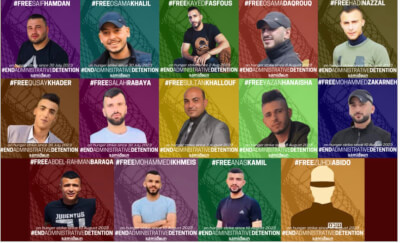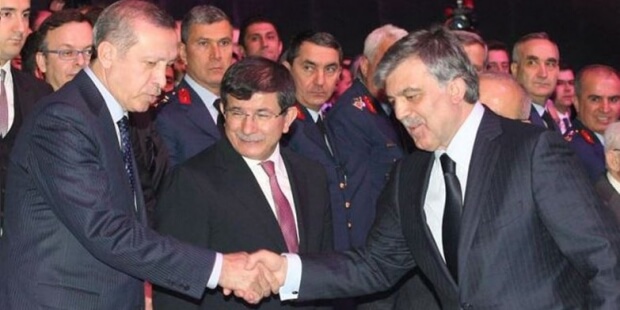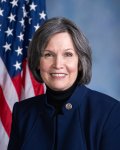The decision by Presidential candidate Bernie Sanders to include American Arab activist Jim Zogby as one of his five appointees to the Democratic Platform Committee will ensure that Middle East peace and the rights of Palestinians will remain on the Democratic Party’s presidential election radar screen. And that is a big deal making the Democratic Party, which has swung in the other direction recently, speak to the issues of Palestinian-Israeli peace. The same action 32 years ago helped create an environment for the Israeli Palestinian peace agreement signed at the White House in 1993
By Ray Hanania
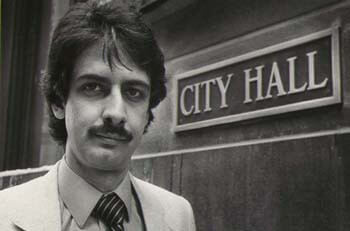
covering Chicago
City Hall
(1976-1992)
In 1984, then presidential candidate the Rev. Jesse L. Jackson opened the door to American Arabs by inviting Jim Zogby to join his election bid as a deputy campaign manager.
Jackson did not win the 1984 Democratic Party nomination, but his appointment of Zogby, one of the most knowledgeable American Arabs engaged in politics, energized American Arabs to actively engage the American political system, not only by voting but also by actually believing they could run for office and win.
Four years later, that activism, and Jackson’s second presidential bid, resulted in a record number of American Arabs being elected as delegates to the 1988 Democratic National Convention and were appointed to the party Standing Committee.
Zogby, the President of the Arab American Institute based in Washington D.C., and other American Arab activists found themselves at the table in Atlanta where political party leaders from across the country decided which issues would be a part of the election discussions and which would be excluded.
One of the big issues that Zogby and others succeeded and placing in the public dialogue was the issue of statehood and human rights for Palestinians. And it’s not a coincidence that five years later at a special ceremony on the White House lawn, Israelis and Palestinians found themselves signing a peace accord to recognize Palestine in the context of Two-States.
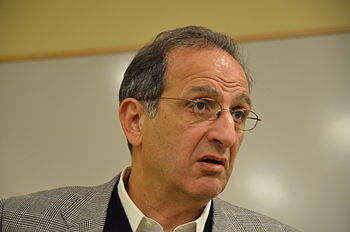
Since then, however, the peace process has taken a powerful hit as extremism and terrorism have pushed reason and justice onto the sidelines of American policy.
This year, thanks almost entirely to the presidential candidacy of Vermont Senator Bernie Sanders, the issue of Two-States, Israel and Palestine is back on the center of the campaign dialogue.
Not surprisingly, Sanders has turned to Zogby the president of the Arab American Institute, to re-inject that issue along with many other issues of social justice and fairness back into the Democratic Party’s national dialogue.
And it couldn’t come at a better time for Palestinian-Israeli peace, which today is in more disarray than it was when the late Israeli Prime Minister Yitzhak Rabin and the late Palestinian President Yasir Arafat shook hands and turned the belief in peace as a real possibility.
Sanders announced last month that Zogby is one of his five nominees to the Democratic Convention National Convention’s Platform Committee. He joins Muslim American Congressman Keith Ellison, African American social activist Cornel West, Global Warming journalist Bill McKibben, and Alaska Native American Deborah Parker.
Sanders defended the appointments to the key committee that will draft the party platform for this summer’s Democratic National Convention.
“We believe that we will have the representation on the platform drafting committee to create a Democratic platform that reflects the views of millions of our supporters who want the party to address the needs of working families in this country and not just Wall Street, the drug companies, the fossil fuel industry and other powerful special interests.”
Zogby said he does not believe that the appointments will result in Palestinians and Israelis returning to the Two-State Solution peace table, but he said it will help redefine the public discourse on the issue among the American public and its elected officials.
“Drafting the platform is an exercise that while it has no impact on actual policies that administrations pursue, it does reflect the current state of the debate within the party. And so having a debate on language and trying to come up with a new consensus of language it is where we are right bow,” Zogby cautioned.
“On some issues, the language hasn’t moved in too many years and the result is it has become ossified. I think the debate within the party is far ahead of where the platform is and Bernie has reflected that. What we are going to see is an effort to create changes in language that reflects the new consensus in the party. It’s a statement, a test of the balance of forces within the party and where the new consensus is, where Democrats are on various issues facing the country.”
Every four years, the two major political parties draft carefully worded statements about what they hope to achieve during the coming four years if they win the White House and Congress.
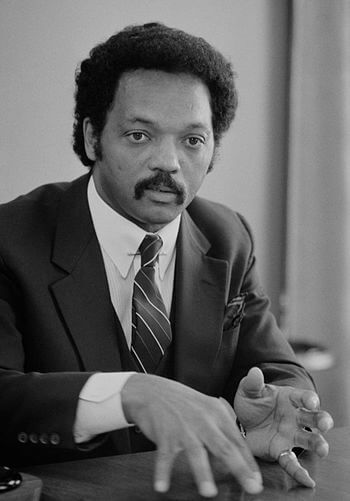
These Platform statements become aspirational documents and are not governing document or political legislation that direct action.
The Platform Committee consists of 15 members including Sanders’ five appointees, six appointees from Presidential contender Hillary Clinton, and four more selected by the leadership of the Democratic Party. They lead the discussion among more than 100 members of the Standing Committee. Two-day long Platform Hearings were scheduled to be held in four cities beginning last week in Washington D.C. on June 8, and in Phoenix, Arizona on June 17. Additional public hearings will be held in St. Louis, Missouri on June 24, and in Orlando, Florida on July 8.
The anticipated public hearings in Orlando may end up focusing on issues related to the Middle East because of the massacre of 49 people at the Pulse Nightclub on June 12 by a killer identified as an Afghani American Muslim.
But in past platform discussions, the focus has remained widespread. And in that context, advocates for Middle East peace have found a base to articulate and educate American voters on the need for a Two-State solution as the only compromise solution to the Palestine-Israel conflict, a solution that could become the basis for a broader-based plan to bring peace to the rest of the Middle East.
“In 1988, we argued for mutual recognition, territorial compromise and self-determination for Israelis and Palestinians. People went through the roof. This was going to be the end of the party. It would destroy the Democratic Party. They weren’t ready for it, even though that is where the majority of Democrats where. There was a poll taken, and the majority agreed with that approach,” Zogby said.
“But 20 years later, that language is commonplace. By the 90s, that is what was in the platform. Israel. Palestine. Two states. By the time we got into the first decade of this century, 2004, they were talking about the Tow-State solution. But the framing of it is still lagging behind where it needs to be. And I think Bernie Sanders, in his speeches, has reflected where that new emerging consensus is in the party. We are going to want to look at language that reflects the way he has approached this issue.”
Zogby cautioned that the 1988 Platform debates and discussions did not kick-start the peace talks between Palestinians and Israelis, but it did define an environment in which Americans were more supportive of the goal of Two-States.
“I think we did was certainly set the stage for an American debate on the issue. Did it have an impact on Israelis and Palestinians? I don’t think so,” Zogby said.
“What it did was, I know for a fact, after the signing ceremony, people who I won’t name who were very high up officials in the Clinton administration who had fought me tooth and nail. I mean it was just a knock down drag out fight in Atlanta. They said I would destroy the party. You’ll never have a place in this party again. This will be on your conscience, etc. They came up to me at the signing ceremony and said that you were right and we were wrong. And this day is not about them but about us too and that you were able to define the issue in a way we were not read to accept it, but you were right. That was a big deal. It set the stage for the debate in this country more than between Israelis and Palestinians.”
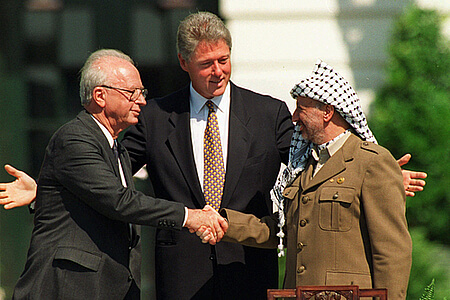
Zogby said having a voice on the Platform Committee is an exercise for the political parties to weigh the issues this country faces not just foreign policy but domestic and environmental and economic issues.
“It is about the party and it is about the relative forces within the movement and where we are. And I think from the polling I have seen and from the reaction I have seen to Bernie around the country that where we are at is clearly on the side of leading this country in a different direction on all these issues. We want a platform that clearly reflects that. This cannot be a platform that says same-old, same-old,” Zogby insisted.
Will the process be as contentious as it was in 1988?
“We are going to approach this as grownups seeking new consensus. I hope we don’t look at it as antagonists but rather as how can we move forward with language where the country is and where the party ought to be. And we’ll what happens with it,” Zogby predicted.
“We will be covering a range of issues. That’s what I have done on the Party Resolution Committee where we go through a whole range of issues every four months when we have our DNC meetings. I am not going to be focused on one issue but on a whole range of issues and we will be asking people on everything from disabilities, to 15 minimum wage to issues around the world.”
A long time supporter of former President Bill Clinton, Zogby praised Sanders saying he was surprised when he heard Sanders announce his appointment during the airing of the NBC Sunday News Program “Meet the Press.”
“I think Sanders has inspired young people but I think he has inspired people around the world in ways that were unexpected,” Zogby noted.
“I don’t think if I were a Palestinian sitting in the shadow of the Wall in Beit Jala, I wouldn’t think I would be looking at a 74 year old congressman from Vermont as the guy who inspired me. That wouldn’t be on my agenda. But he did. And his ability to speak unvarnished truths about these issues and is having an impact on people all over the world. I was just in the UK and in Ireland and people are very impressed that this kind of debate is going on. They are looking at Bernie Sanders’ campaign and saying Oh My God, people are saying things that we thought might never be said again.”
Zogby said Sanders is determined to empower Americans to become more engaged in addressing the challenges this country faces here and abroad.
“What he has done is to empower a movement in a way that the Rev. Jesse L. Jackson empowered a movement that had tremendous pretext on bringing people together around a need for fundamental change on these issues, including on the Israeli-Palestinian issue,” Zogby said.
“And we’re not done yet. Nobody is looking for Chicago 1968. We are looking for a way to build consensus and move the language forward. But everyone knows that Bernie is not going just fold on these issues. He is going to fight them out. There is a resolve here. Because the formula of the past has not worked.”
(Ray Hanania is an award winning former Chicago City Hall reporter and political columnist. He is president of Urban Strategies Group Public Affairs and is editor of TheArabDailyNews.com website. Send him your comments at rghanania@gmail.com.)


- Israelisnipers shooting and killing hospital workers in Gaza - December 11, 2023
- CAIR Condemns Israeli Executions of Wounded, Unarmed Palestinian in West Bank - December 11, 2023
- Arab and Muslim American voters face a “simple choice” between Biden’s inhumanity and Trump’s edgy politics - December 9, 2023
















